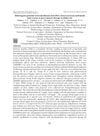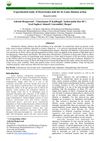10 citations,
December 2020 in “Palaeogeography, palaeoclimatology, palaeoecology” Elephant tusks and hair reveal seasonal diet and climate changes.
 January 2018 in “Journal of general practice”
January 2018 in “Journal of general practice” Young people are losing hair due to stress, poor diet, pollution, and lack of sleep, but it can be treated with supplements and scalp treatments.
 54 citations,
August 2005 in “Alcohol”
54 citations,
August 2005 in “Alcohol” Finasteride affects alcohol intake in male mice, possibly due to neurosteroids.
 38 citations,
April 2018 in “Psychopharmacology/Psychopharmacologia”
38 citations,
April 2018 in “Psychopharmacology/Psychopharmacologia” Blocking CRF-R1 can reduce alcohol intake in stressed mice.
 13 citations,
September 2022 in “Materials & design”
13 citations,
September 2022 in “Materials & design” The new patch for treating mouth sores releases medicine slowly, sticks well, and helps healing without the side effects of current creams.
 October 2022 in “Frontiers in Endocrinology”
October 2022 in “Frontiers in Endocrinology” New tools show that in fish, NPY increases feeding and somatostatin decreases it.
 15 citations,
March 2014 in “Biochimica and biophysica acta. Molecular and cell biology of lipids”
15 citations,
March 2014 in “Biochimica and biophysica acta. Molecular and cell biology of lipids” ACBP is essential for healthy skin and fur by maintaining the skin's barrier function.

Drinking sweetened tea and late bedtimes increase the risk of hair loss in women.

Drinking sweetened tea and poor sleep habits may increase the risk of hair loss in women.

Drinking sweetened tea and late bedtimes increase the risk of hair loss in women.

Drinking sweetened tea and poor sleep increase the risk of hair loss in women.
 20 citations,
January 2021 in “GeroScience”
20 citations,
January 2021 in “GeroScience” Spermidine helps protect against aging by preserving telomere length.
 34 citations,
November 2011 in “Alcoholism: Clinical and Experimental Research”
34 citations,
November 2011 in “Alcoholism: Clinical and Experimental Research” Three drugs change mice's alcohol drinking patterns by affecting GABAA receptors.
 67 citations,
May 2018 in “Journal of Ginseng Research”
67 citations,
May 2018 in “Journal of Ginseng Research” Red ginseng may improve immunity, fatigue, memory, blood circulation, and menopausal symptoms, and is generally safe to consume.
 9 citations,
January 2014 in “DARU Journal of Pharmaceutical Sciences”
9 citations,
January 2014 in “DARU Journal of Pharmaceutical Sciences” Cuscuta reflexa extracts helped regrow hair in rats with drug-induced hair loss.

Drinking sweetened tea and poor sleep habits increase the risk of hair loss in women.
 December 2020 in “Nigerian journal of animal production”
December 2020 in “Nigerian journal of animal production” Dexamethasone can cause diabetes in rats, and Annona muricata bark extract may help lower blood sugar.
 97 citations,
October 2019 in “Journal of Translational Medicine”
97 citations,
October 2019 in “Journal of Translational Medicine” A very low-calorie ketogenic diet is effective for quick weight loss and improving health in obese patients, with careful management of side effects and maintenance.
March 2025 in “Journal of Clinical Medicine” Low-dose oral minoxidil effectively treats alopecia but can cause side effects like excess hair growth and fluid retention.
 60 citations,
October 2005 in “Experimental Dermatology”
60 citations,
October 2005 in “Experimental Dermatology” Zinc can both inhibit and stimulate mouse hair growth, and might help recover hair after chemotherapy.
 268 citations,
April 2009 in “International Journal of Pharmaceutics”
268 citations,
April 2009 in “International Journal of Pharmaceutics” Niosomes improve minoxidil skin delivery for hair loss treatment.
 30 citations,
June 2006 in “British journal of dermatology/British journal of dermatology, Supplement”
30 citations,
June 2006 in “British journal of dermatology/British journal of dermatology, Supplement” Oral zinc sulphate reduces dark hair color in mice.
 18 citations,
October 2013 in “EFSA Journal”
18 citations,
October 2013 in “EFSA Journal” Coriander seed oil is safe for healthy adults at up to 600 mg per day.
 14 citations,
June 2015 in “Toxicology and Industrial Health”
14 citations,
June 2015 in “Toxicology and Industrial Health” Low doses of BPA can increase prostate growth and change hormone levels in adult rats.
 April 2024 in “bioRxiv (Cold Spring Harbor Laboratory)”
April 2024 in “bioRxiv (Cold Spring Harbor Laboratory)” Removing Sprouty genes in mice causes various hormone-related issues but does not increase cancer risk by one year of age.
 October 2022 in “International journal of Ayurvedic medicine”
October 2022 in “International journal of Ayurvedic medicine” Karaviradya taila reduces hair growth and hair follicles.
 June 2022 in “Asian Pacific journal of health sciences”
June 2022 in “Asian Pacific journal of health sciences” Ayurvedic treatments like bloodletting, herbal packs, and medicated liquid flow over the head are a safe and effective alternative for hair loss.
 116 citations,
April 2002 in “American journal of veterinary research”
116 citations,
April 2002 in “American journal of veterinary research” Trilostane effectively and safely treats dogs with pituitary-dependent hyperadrenocorticism, improving symptoms and adrenal gland size.
 96 citations,
September 2017 in “Analytica Chimica Acta”
96 citations,
September 2017 in “Analytica Chimica Acta” Hair elemental analysis could be useful for health and exposure assessment but requires more standardization and research.
 96 citations,
June 2017 in “Nature Communications”
96 citations,
June 2017 in “Nature Communications” A WNT10A gene mutation leads to ectodermal dysplasia by disrupting cell growth and differentiation.



























